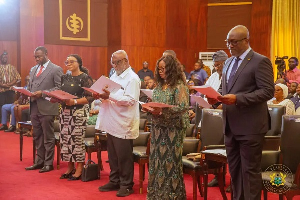The Petroleum Bill currently being rushed through Parliament is one of the worst things that could happen to Ghana at this point in time. Unless Parliament takes very drastic steps now to stall the passage of the Bill, Ghana would lose a historic opportunity to end the predatory and practically terroristic attacks on our Policy Space; stop the pillage of our natural resources; stabilise our macro-economy once and for all; and realize the benefits of real, genuine and productive livelihoods, good healthcare, happy and secure families, and boundless opportunities for all.
Since the discovery of oil in commercial quantities, Ghana has adopted the Royalty-Tax System (re-shaped into what is called the “Ghana Hybrid System”) as the mechanism for benefitting from her oil resources. This system is skewed towards the collection of taxes from oil companies. All progressive “Third World” Developing Countries with Oil and Gas reserves are moving away from this predatory system, not least because empirical evidence and experience have established that it is near impossible for countries that cannot collect taxes from petty traders living in-country, to collect the requisite taxes from multinational oil companies with complicated and tax evading and tax avoiding structures and systems. Yet it is this discredited system that is contained in the Petroleum Bill currently before our Parliament.
Currently before Parliament are other very critical Bills. These deal with managing the governmental transition after the 2016 elections; the right to information; property rights of spouses; and many others crying for attention, some for up to 10 years. Yet, Parliament has prioritised over these the Petroleum Bill that was re-laid in Parliament last month. Already, Parliament has done for this Bill the first reading; referred it to the Committee on Mines and Energy; had the Committee on Mines and Energy meet severally over the Bill; met stakeholders over the Bill; completed a report on the Bill; laid the report before the entire Parliament; had Parliament accept the report; undertaken the second reading; held winnowing sessions on the Bill in order to streamline the many amendments proposed; and started the Consideration Stage for the Bill leading up to the Third and final Reading and Passage of the Bill into law! Actually, but for a hitch or two, the Bill could have been passed into law last week! How efficient of Parliament.
The Principal reason why Parliament is in a mad rush to pass the Petroleum Bill, actively urged on by mostly foreign interests, and supported by their local agents, is because they do not want to risk having to do an in-depth consideration of three (3) sets of public challenges that are coming up whilst the Bill is festering in Parliament.
First, there is a real sense that individual members of Parliament, deep down their hearts, are opposed to the Bill. MPs have previously proposed amendments to literally every substantive provision in the Bill, a very unusual scenario in Parliament. When the Bill was first laid, over 100 amendments were proposed, affecting all substantive clauses. Even after it was withdrawn, reworked and re-laid recently, 45 new amendments were proposed by MPs. When amendments are this many it is indicative of a tacit rejection of the Bill by Parliament. No wonder the Bill had to be withdrawn some two times after many years on the burner and finally re-laid in Parliament with some cosmetic changes, which changes in most cases greatly exacerbated the bad conditions of the Bills that were withdrawn in the first place.
The reason why the Bill still faces about 50 proposed amendments is simple: the reworking of the Bill in its 2016 re-incarnation did not address the policy change that is mandated by the full effect of the array of amendments proposed by MPs themselves and the requirements of existing laws, not to mention those of Think Tanks and CSOs.
The second reason why the Petroleum Bill is being rushed through Parliament is that the Executive and Parliament do not want to be confronted with the set of critical principles in the report of the Constitution Review Commission and the Government White Paper that are meant to ensure that Ghana’s natural resources actually benefit Ghanaians and that, going forward, those resources are treated in a manner that aids our developmental march forward.
After many years of research, country-wide consultations, diaspora consultations, consultations with Parliament itself, and international comparative analyses, the Commission teased out these cardinal principles which were accepted by government in a White Paper. It is, therefore, policy incongruity for the Executive and Parliament to completely ignore those principles in its consideration of the Petroleum Bill.
Third and finally, Parliament is rushing the Bill because she does not seem to want to do what it must do for Ghana, for us, for our children, and for our children’s children, to the third and fourth generations and forever, that is, adopt for Ghana the Production Sharing formula for the distribution of Oil revenues and benefits. Simply, the Production Sharing formula operates along the lines of share cropping in agriculture, where the owner of the land grants a farmer the right to grow crops on his or her land, and shares in the proceeds with the farmer according to agreed proportions after the harvest. As the name implies, Production Sharing focuses on the sharing of the output of Oil and Gas produced in agreed proportions between the oil companies and Ghana.
If Ghana had adopted this formula for the recent oil find, she would have earned over US $9 billion from her Oil resources between 2010-2015, representing 60% of total production revenue of over US $15 billion. Compare this to the paltry US $3 billion earned over the same period, representing 19.4% of total production revenue. This is the point GIGS, joined by the FTOS-PSA Ghana Campaign, have been making to the Committee for several years. Sadly, Parliament has been fed, and is in turn feeding the public with other figures and arguments to the effect that the cash receipts under the so-called “Ghana Hybrid System” and under Production Sharing are the same. This is absolutely not true.
In this regard, we need to pose a few questions to Parliament:
1. Are they talking of mere cash receipts or the monetary value of all incomes and benefits that accrue to oil companies and their mother countries on the one hand, and to Ghana on the other?
2. Do the cost of production figures they have been fed take adequate account of inflated prices and especially sophisticated transfer pricing mechanisms used by the oil companies?
3. Have the figures been discounted for political, economic and social costs of drilling oil in commercial quantities in Ghana?
From the analyses above, if we had adopted the Production Sharing mechanism, the current government would not have needed to contract so many loans to finance development projects. In fact, all the financing for all the development projects Ghana has undertaken in the last few years would have come from oil resources, even with the recent slump in oil prices, effectively weaning Ghana of development aid and marauding financiers.
The above fact is what is so scary to many who want the current Bill passed into law. They cannot imagine and cannot live with a Ghana which is truly independent of loans, the IMF, the World Bank, Development Partners and the predatory and terroristic attacks on Ghana’s policy space that comes with them.
The policy of Production Sharing is the thing now! All serious and progressive countries, and even some not-too-serious and progressive ones have opted or are opting for Production Sharing. Togo, Sierra-Leone, Liberia, Cote d’Ivoire, Senegal, Republic of Benin, Niger, Mauritania, Uganda, Kenya, Tanzania, Madagascar, Eritrea, Somaliland and South Sudan - have all opted for Production Sharing, following in the footsteps of the older oil producing countries: Nigeria, Angola, Libya, Egypt, Gabon, Chad and others.
We hear that the Consideration Stage of the Bill is now scheduled for October this year. Before that date, we will work to produce a detailed brief for distribution to all MPs as to why they must use this opportunity to save Ghana by writing the Production Sharing mechanism into the Petroleum Bill or in the alternative, not pass the current Bill.
Our Dear MPs…
Listen to your hearts…
Do not listen to your heads, chests, stomachs, hands, feet…
And do the right thing for yourselves, for your children and for Ghana….
Otherwise we will be constrained to vote you out…
We need every Ghanaian to commit today that any MP who votes in favour of the current monstrous and unprogressive Petroleum Bill in Parliament will not be returned to Parliament come 7th November or 7th December, and definitely come 7th January.
Opinions of Saturday, 30 July 2016
Columnist: Atuguba, Raymond Akongburo














